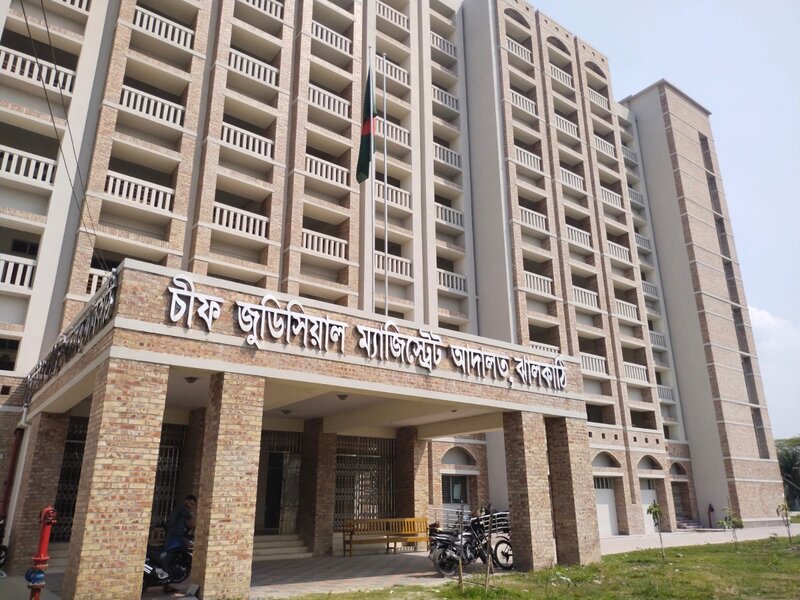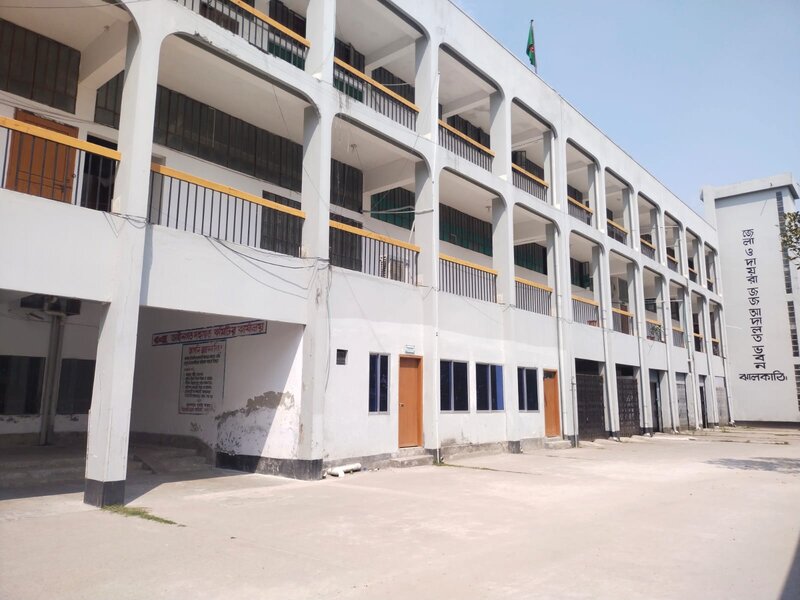Home About Us History of District Judiciary
Brief History of Jhalakathi District: Jhalakathi was once a police station of Barisal. On 1st July 1971, Jhalakathi was converted into a Sub-Division and started functioning as a Sub-Division from 1972. Later on 1st February 1984, Jhalakathi was converted into a district. The southern part of greater Barisal was covered by the Sundarbans and Jhalakathi is a part of it. Eminent historian and Bakerganj District Magistrate Beverage wrote, once the river covered the vast area of Jhalakathi. The deep forests that formed part of the Sundarbans naturally developed along the rivers. A major occupation of the population was fishing in the rivers. For their own needs while hunting fish, these people cut forests and settled and created crop fields. At that time a group of Kaivarta fishermen lived on the south bank of Sugandha river. Kaivarta fishermen once clashed with the villagers over some issue. Defeated and left the area, the Kaivarta fishermen settled on the west bank of the Bashanda Canal in present day Jhalakathi by cutting down the jungle and creating crop fields. Since then the name of this region is Jhelekathi. Later the name Jhalakathi was changed to the present Jhalakathi.
District and Sessions Judge Courts: Before 1971, Jhalakathi was a police station in Barisal. Munsif Court was established at Jhalakathi on 19/11/1973. The first Munsif of Jhalakathi was Mr. Humayan Ali. In 1983 a Sub Judge Court was established at Jhalakathi and Mr. Mosharraf Hossain served as the first Sub Judge. Later, on 1st February 1984, when Jhalakathi was converted into a district, Jhalakathi District and Sessions Judge Court was established. The first district judge was Mr. Abdul Jalil. He joined as First District and Sessions Judge, Jhalakathi on 15/01/1985 and later became Judge of High Court Division. Jhalakathi District Judge Court has a total of eight courts including the District Judge's Court. One Additional District and Sessions Judge's Court, two Joint District and Sessions Judge's Court, one Land Survey Tribunal, one Senior Assistant Judge's Court and three Assistant Judge's Court.
Nari O Shishu Nirjaton Daman Tribunal: There was no Nari O Shishu Nirjaton Daman Tribunal in Jhalakathi before 2021. Nari O Shishu Nirjaton Daman Act cases were tried by the District and Sessions Judge himself. In 2021, the Nari O Shishu Nirjaton Daman Tribunal was established in Jhalakathi. Mr. MA Hamid is the first judge of Jhalakathi Nari O Shishu Nirjaton Daman Tribunal.
Chief Judicial Magistrate's Court: Jhalakathi Chief Judicial Magistrate's Court was established on 1st November 2007 after the separation of the Judiciary from the Executive. There are five courts in total in Jhalakathi Magistrates Court including Chief Judicial Magistrate Court, two Senior Judicial Magistrate Courts and two Judicial Magistrate Courts. Mr. Reza Tariq Ahmad in the first Chief Judicial Magistrate. Being a small district, there is no post of Additional Chief Judicial Magistrate in Jhalakathi.
Land Survey Tribunal: There is a Land Survey Tribunal under the District and Sessions Judge of Jhalakathi. In 2012, Land Survey Tribunal was established in Jhalakathi. Initially a joint District and Sessions Judge handled the judicial work of the Land Survey Tribunal as an additional charge. First Judge appointed in Jhalakathi Land Survey Tribunal on 01/02/2016. The first judge of the Land Survey Tribunal was Mr. Md. Masudur Rahman. Cases relating to khatian revision are filed in the Land Survey Tribunal.
District Legal Aid Office: Government established District Legal Aid Office in 2013 to provide free legal services to poor, distressed and helpless people. The service activities of the District Legal Aid Office are conducted in accordance with the provision of Legal Aid Act, 2000. A District Legal Aid Officer is responsible for alternative dispute resolution, providing free legal advice and managing the cases of poor and distressed people at public expense. A Senior Associate Judge performs duties as District Legal Aid Officer on deputation. On April 4, 2019, Mr. Shibli Noman Khan was posted as the first District Legal Aid Officer in Jhalakathi.
District Lawyers Association: Jhalakathi District Lawyers Association was established on 25/09/1973 with 17 members. The first President of Jhalakathi Bar Association was Mr. Advocate A. Sattar and the General Secretary was Mr. Advocate Abdul Awal. At present Jhalakathi Bar Association has 224 registered members and 182 regular practicing members.
Terror attack on Jhalakathi Judges: On the morning of November 14, 2005, extremist militant groups carried out a planned barbaric and demonic bomb attack on judges in Jhalakathi. In this bomb attack, the bodies of Associate Justice Jagannath Paday and S Sohail Ahmed died tragically and the microbus carrying them was also twisted. The attacker was identified as Iftekhar Hasan Al Mamun alias Shihab. Police arrested the attacker while injured and recovered leaflets and unexploded grenades from him. The recovered leaflets read “Man-made laws are not obeyed. Taguti does not obey the law. Abolish man-made laws.” The name of Jamaat Mujahideen Bangladesh was mentioned as the name of the organization. The militants were sentenced to death in the trial for killing the two assistant judges. On 29/05/2006 Jhalakathi Additional District and Sessions Judge Reza Tariq Ahmad convicted seven militants under section 120K/302/34 and sentenced them to death. The case number in which the execution of the militants was ordered was Session 28/2006. When the charge sheet was read out to militant leader Abdur Rahman, his response was, "I ordered the killing of those who do not judge by the law of Allah." Two judges were killed on my orders. I am guilty by the law of man but not guilty by the law of God. I will not hire a lawyer. 'The other accused were named as Siddiqul Islam Pramanik alias Bangla Bhai, Abdul Awal, Mamun, Ataur Rahman Sani and Amjat. Hon'ble High Court Division confirmed the order of execution of the Trial Court in Death Reference No. 47/2006. The convicts did not appeal to the High Court Division. Convicted Iftekhar Mamun filed a jail appeal in the Appellate Division. Others filed no appeal in the Appellate Division. Convicted Abdur Rahman filed a petition in the Appellate Division, where his statement was, "Therefore, those who seek justice from human-made constitutions, laws or laws, even though they claim to be Muslims, Allah has told them in the above verse that they are not believers." Therefore, if someone commits an act that destroys faith, he will not be spared if he claims to be a Muslim. Abdul Awal, another convict, mentioned in his petition, ...Your Majesty is willing to appeal for leave to appeal to the High Court against my execution, provided I am given an opportunity to defend myself and be tried according to Islamic law. .... Therefore, against the execution of my death sentence, I appeal to the higher court to form an Islamic juridical board and re-trial it under the law of Allah, if not possible, I appeal not to try it under Taguti law.' The Appellate Division termed these claims of the convicts as pipe dreams and opined that our constitution does not recognize such a system of justice. The demand for justice in Islamic law is a strange concept and is unknown in our judicial system. [59 DLR (AD) p. 35] The militants were subsequently executed.





